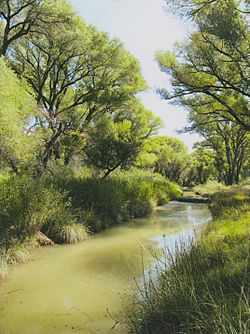Babocomari River facts for kids
Quick facts for kids Babocomari River |
|
|---|---|

The Babocomari River in 2014.
|
|
| Country | United States |
| Location | Santa Cruz and Cochise Counties, Arizona |
| Physical characteristics | |
| Main source | Sonoita Basin |
| River mouth | San Pedro River, Fairbank, Arizona 3,825 ft (1,166 m) 31°43′20″N 110°11′38″W / 31.72222°N 110.19389°W |
| Length | 25 mi (40 km) |
| Basin features | |
| River system | Colorado River |
The Babocomari River is an important river in southeastern Arizona, USA. It flows into the San Pedro River, which is another major river in the area. The Babocomari River is about 25 miles (40 kilometers) long. It helps drain water from a large area of land.
Contents
About the Babocomari River
The Babocomari River starts in a place called the Sonoita Basin. This basin is a low-lying area where water collects. The river then flows towards the east. It travels through different landscapes before joining the San Pedro River.
Where Does the Babocomari River Flow?
The river begins near a small community called Elgin, Arizona. From there, it flows eastward. After about 25 miles, it meets the San Pedro River. This meeting point is just south of the Fairbank Historic Townsite. This area is part of the San Pedro Riparian National Conservation Area. This conservation area helps protect the river and its surroundings.
What Areas Does the River Drain?
The Babocomari River collects water from a big area. This area covers about 310 square miles (800 square kilometers). It includes parts of several mountain ranges. These are the northern Huachuca Mountains, the northwestern Canelo Hills, and the southern Mustang Mountains. The river is one of three main waterways that drain the Sonoita Basin. The other two are Sonoita Creek and Cienega Creek.
Plants and Habitats Along the River
The land around the Babocomari River is very special. Along the main path of the river, you can find many riparian trees. These are trees that love to grow near water. They form a green border along the riverbanks. There are also small marshy grasslands. Marshes are wet, grassy areas. These habitats provide homes for many different plants and animals. They are important for the health of the local environment.
 | Tommie Smith |
 | Simone Manuel |
 | Shani Davis |
 | Simone Biles |
 | Alice Coachman |

